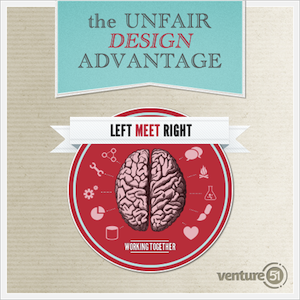
Technical founders have already become prerequisites in the world of tech startups. Now get ready for the designer founder. The combination of this new duo is going to change the world of tech forever.
To quote Daniel Pink in his book A Whole New Mind,
The last few decades have belonged to a certain kind of person with a certain kind of mind—computer programmers who could crank code, lawyers who could craft contracts, MBAs who could crunch numbers. But the keys to the kingdom are changing hands. The future belongs to a very different kind of person with a very different kind of mind—creators and empathizers, pattern recognizers, and meaning makers. These people—artists, inventors, designers, storytellers, caregivers, consolers, big picture thinkers—will now reap society’s richest rewards and share its greatest joys.
Although we agree with Daniel Pink’s quote and premise, we are by no means diminishing the role of the technical founder. We’re huge advocates of engineers/hackers (aka technical founders) and believe their “in-house” talents are crucial in this new tech renaissance. Our position here is to highlight the importance and opportunity of the emerging technical and design founder duo. We strongly believe that both are equally important!
High-concept, high-touch mentalities in tech startups are a winning proposition. When founders seek out talent these days, most of them (at least in our experience) are looking for designers as much as for engineers. This is mainly because, more often than not, it is the technical founders who are starting companies, and they realize that creating an exceptional user experience is a competitive advantage. Adding “Design Founders” to the mix is a potential “black swan:” hard to predict, highly improbable, and will change the world— potentially redefining the high tech landscape.
There is, however, a shortage of good startup designers, at least when it comes to people who have both interaction and product design experience and skill sets. Designers today are being asked to do more than simply build visuals and hand them off to engineers. They are evolving into experts in user research (customer development), information architecture (IA), interaction design (IxD), visual design, and storytelling (copy writing and messaging). They also possess back-end skills and have a thorough understanding of the technology stack that the product is being built on. Just as importantly, they get the big picture and realize that user experiences are built around business models as well, including marketing, distribution, customer support, sales, business development and operations.
Bringing user-centered design to the agile process is producing a new generation of startups. Design is no longer considered tactical; instead, it is recognized as a strategic component of the startup process by the tech mainstream. While it’s really always been strategic, it’s only recently that the perception has caught up with the reality (consider Apple, IDEO, Target, Design Within Reach & Coca Cola). This new breed is whole-minded, leveraging the right brain to create experiences and the left to analyze the experiential data in order to iterate and improve.
This breed of founder is focused on weaving their new sensibilities into the strategic fabric of the startup, forging the path to the customer through user metrics, customer metrics, product flows, and conversion funnels. Last, but not least, they are sociable. They seek to understand user behavior and empathize with users, rather than constantly defending their creative output.
Design founders are creating an “unfair advantage” by opening up new markets and reconfiguring existing ones. The new world of design is displacing incumbents all over the IT landscape.
User experience-driven innovation will most likely bring large-scale change (and financial success) to the evolving startup landscape. With lower startup costs and a vastly expanded global market for online and mobile services (almost 2B people on the Web and billions using smart phones) combined with cheaper online distribution, building better user experiences will become the way of the future.
Bottom line: As we move out of the age of information and into the conceptual age, we are faced with the demand to create product experiences that are no less than exceptional.
Venture51 is high-centered on design/user experience-driven startups. Part of our core strategy is to align with the best design founders globally and expose their expertise to this unique opportunity in the high-tech startup ecosystem. It’s not a matter of if or even when these changes will take off; it’s here now, and for the foreseeable future we are betting big on this design-driven thesis. This new frontier creates a competitive edge we like to refer to as the Unfair Design Advantage.
VentureBeat's mission is to be a digital town square for technical decision-makers to gain knowledge about transformative enterprise technology and transact. Learn More
